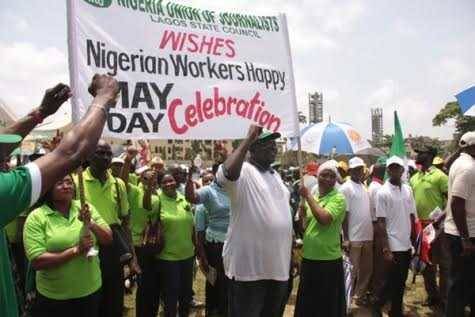Another Workers’ Day, a new hope
In a piece titled, “A May Day like no other” written some two days before its publication date of May 1, 2017, I stated that one did not have to be a soothsayer to predict that that year’s May Day a.k.a. Workers’ Day celebration would be mooted; that it would be devoid of the carnival-like […]


In a piece titled, “A May Day like no other” written some two days before its publication date of May 1, 2017, I stated that one did not have to be a soothsayer to predict that that year’s May Day a.k.a. Workers’ Day celebration would be mooted; that it would be devoid of the carnival-like atmosphere that characterised May Days in past years wherein workers from various sectors , dressed in colourful segmented uniformed attires and armed with the symbols of their trades marched convivially before select dignitaries in packed mini stadiums and squares amidst background drums, songs and music. The mood amongst workers during last year’s May Day was, to say the least, sombre as the average Nigerian worker grappled with the challenges of keeping body and soul together as well as catering to the basic necessities of his family, namely, food, shelter, clothing plus healthcare and education. In Abuja the federal capital territory, the commemoration of the 2017 edition at the Eagles Square ended in confusion as assembled workers sought to vent their anger on government officials, led by the Labour Minister, Dr. Chris Ngige, resulting in hurried dispersal of guests. I concluded that article by asking, ‘Will 2018 May Day be better? We wait what it will have in stock’.
Well, May 2018 is here. Fundamentally the problems remain the same but there is some little difference this year. For one, prices of foodstuff are beginning to stabilise, at least prices of goods are not rising literally every week as used to be the case as at May of last year. Officially, the country’s inflation rate is down comparatively. More importantly, workers are awaiting some cheering news in the form of a new minimum wage that had been touted by the Muhammadu Buhari-led administration. It involved a long drawn out negotiation between Government and Labour. Government is promising that the new minimum wage will come into effect by July. There are no exact numbers as yet but figures being suggested range from N50, 000 to N150, 000. Minister Ngige would probably let us know on this May Day.
Whatever the figure and much as it is deserved because of diminishing purchasing power of workers, will it really make a difference to their pockets considering that market women and market men would similarly jerk up prices of their wares upon its announcement to the general public. Moreover, without any comparative increase in federation allocation to states will the state governments be able match up with the new salaries? In the face of any very significant rise in international oil price (our major foreign exchange and revenue earner) or special financial support package to the states, to boost their treasuries will those of them that are lagging behind in payment of salaries and wages as well as others, be able to cope with the additional expenditure? The state governments could find a way round it by retrenching staff, increasing internally generated revenue (by bringing more people and things into the tax net and increasing the rate itself) and borrowing. With the general elections fast approaching some of these options could be seen as anti-people and fraught with political price. Labour’s argument will be that governments can always find the money to pay for a new minimum wage bill by checking corruption within it, plugging financial leakages and setting its priorities (by way of what projects to execute) right.
Victoria Ikeano, Lafia
